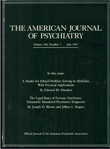This book endeavors to provide readers with a glimpse into the development of psychiatry in Canada, as well as to highlight major past and current Canadian research contributions to the field. This book would be a great reference for the Canadian psychiatrist but can be informative and interesting for the non-Canadian as well. Historical progress, health care funding problems, and research developments are not limited by geographic boundaries.
The two introductory chapters succinctly summarize the development of universal health care in Canada as well as the pros and cons of the system. They also discuss the controversial health care reform that is occurring in the provinces. The demographics of Canadian psychiatry are reported, including the interesting fact that the psychiatrist-to-population ratio is within the recommendations of the World Health Organization but that, as in other countries, there is geographic maldistribution. Along with the development of health care in Canada, the parallel emergence of the field of psychiatry from the nineteenth century to the present is also discussed. These two chapters are well-written and complementary introductions that establish a context for what follows.
The book is organized into three main sections following the introductory chapters. The first, Services, consists of 23 short referenced chapters that relate the history and present organization of different areas in Canadian psychiatry. Areas dealt with include infant psychiatry and geriatrics, biological and psychological treatments, and financing and bioethics. Of particular note are the following chapters: “Native Issues” by the late Clare Brant, “Addiction Psychiatry and Management of Substance-Related Disorders” by Nady el-Guebaly, and “Legislative Issues and Their Impact on Psychiatry” by Brian Hoffman. The second section, Education, consists of two chapters that discuss undergraduate to postgraduate training as well as the recent programs for maintenance of competence. The third section, Research, reads like a Who's Who in Canadian psychiatric research and discusses relevant past and present significant contributions to the psychiatric literature. What becomes obvious while reading is that although Canada enjoys a richness in research diversity, the areas that historically and consistently are considered strengths include contributions to the fields of schizophrenia, epidemiology, genetics, and imaging.
One main criticism of this work is that the chapters are brief. This may be helpful to some readers, but it limits the amount of material that can be presented on any given topic. I wanted more from some of the more interesting chapters. However, references are included for those interested in further reading.
The editor, Quentin Rae-Grant, faced the task of relaying the development of a large field of medicine in a large country without becoming tedious. His book accomplishes that task in a way that allows for enjoyable reading.

